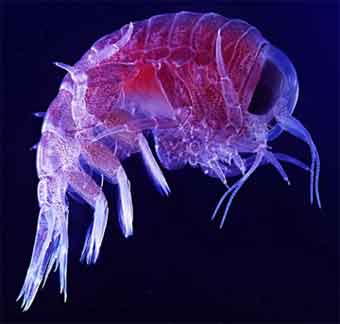Plankton is known as the food source for whales. Did you know that these microscopic beings that live in the ocean contribute to the formation of the clouds that are thousands of meters above them? Most plankton produces a chemical material called dimethyl sulphide. This material is combined with oxygen and becomes sulphate. Sulphates form the condensation nuclei for the water vapour on the surface of the oceans and thus form clouds. These nuclei do not cause rain as they are too big; nevertheless they prevent clouds from reflecting or absorbing the rays coming from the sun. This is called “albedo” (a measure of how strongly an object reflects light from light sources such as the sun). Dimethyl sulphide increases albedo. Thus, clouds reflect the rays coming from the sun, and accordingly the solar rays reaching the earth decrease. Plankton that many of us have never seen before in our lives, have a significant role within the very delicate ecological balance of the world. Due to these tiny creatures consuming sulphur in the oceans, solar rays do not reach the earth in excessive amounts, and therefore the temperature does not increase significantly. This prevents the earth’s surface from being scorched, and facilitates a habitable environment.
Most plankton produces a chemical material called dimethyl sulphide. This material is combined with oxygen and becomes sulphate. Sulphates form the condensation nuclei for the water vapour on the surface of the oceans and thus form clouds. These nuclei do not cause rain as they are too big; nevertheless they prevent clouds from reflecting or absorbing the rays coming from the sun. This is called “albedo” (a measure of how strongly an object reflects light from light sources such as the sun). Dimethyl sulphide increases albedo. Thus, clouds reflect the rays coming from the sun, and accordingly the solar rays reaching the earth decrease. Plankton that many of us have never seen before in our lives, have a significant role within the very delicate ecological balance of the world. Due to these tiny creatures consuming sulphur in the oceans, solar rays do not reach the earth in excessive amounts, and therefore the temperature does not increase significantly. This prevents the earth’s surface from being scorched, and facilitates a habitable environment.
The contribution to life on earth performed by this organism – whose role perhaps many of us are hearing about for the very first time, is only one example of all the magnificent creations of Our Lord.
TOPICS
VaticanSocialismIlluminationFrench RevolutionConvertSabbateanJacobinismMasonic MediaPolitical ZionismYoung TurkThe Committee of Union and ProgressAbdulhamidAnti-NaziWorld Zionist Organization Nuremberg LawsMussoliniWorld War IAdolf EichmannGoyimThe Rothschild DynastyThink-ThankCFRRockefellerCold WarStalinOctober RevolutionSoviet UnionBilderbergVietnamAIPACLobbyfairSoutheastGreeceNew World OrderRed Seageopoliticsveterantaxcustoms2023antelopebullEurasia Islam CouncilNobel PrizeHospitalSocial Security InstitutionAli BabacanTurgut OzalassassinationGaffar OkkanMuhsin YazıcıoğluRosetta NebulaAstronomyRose


